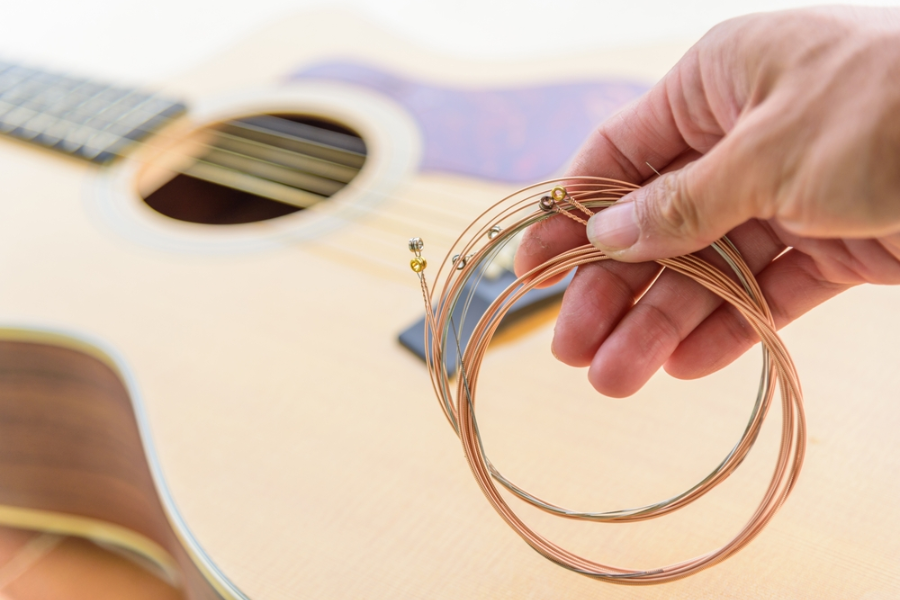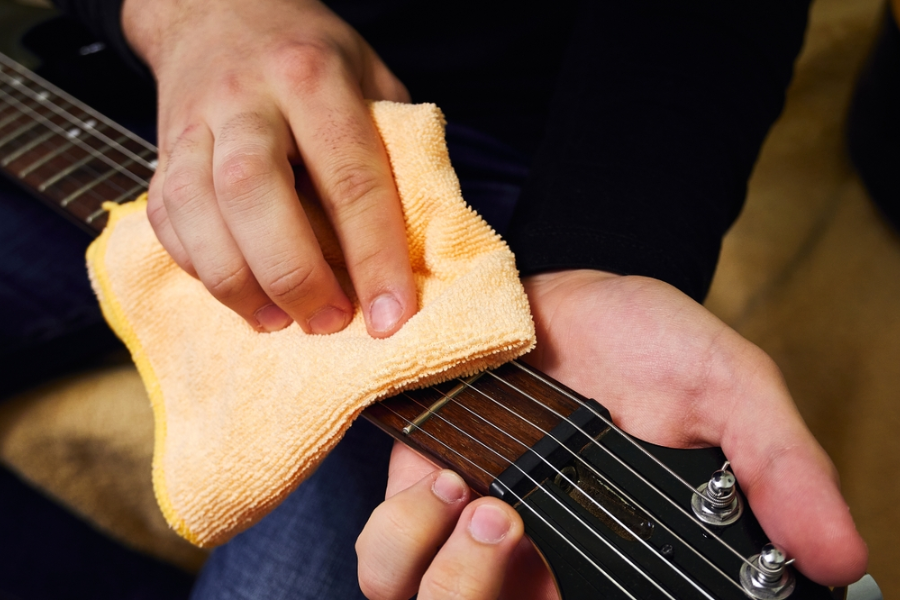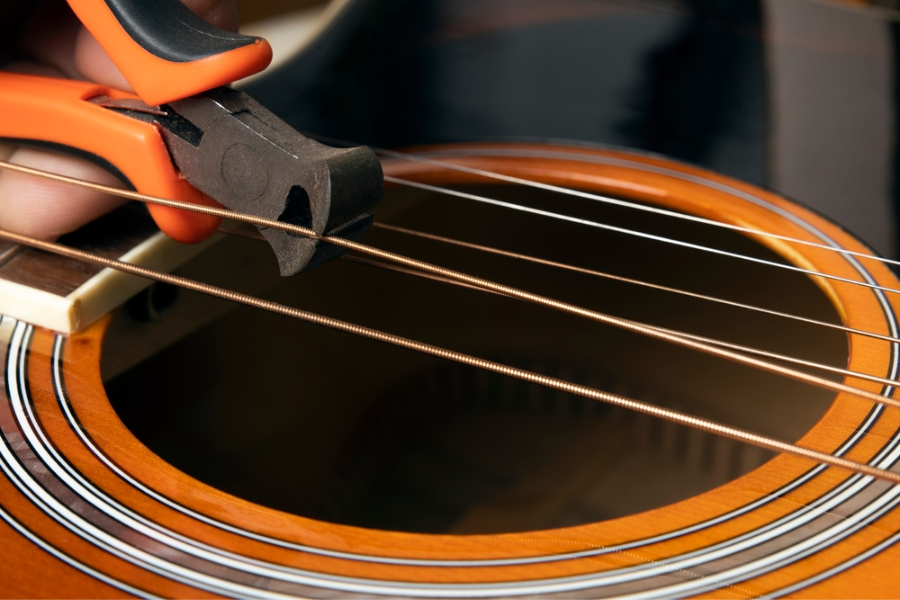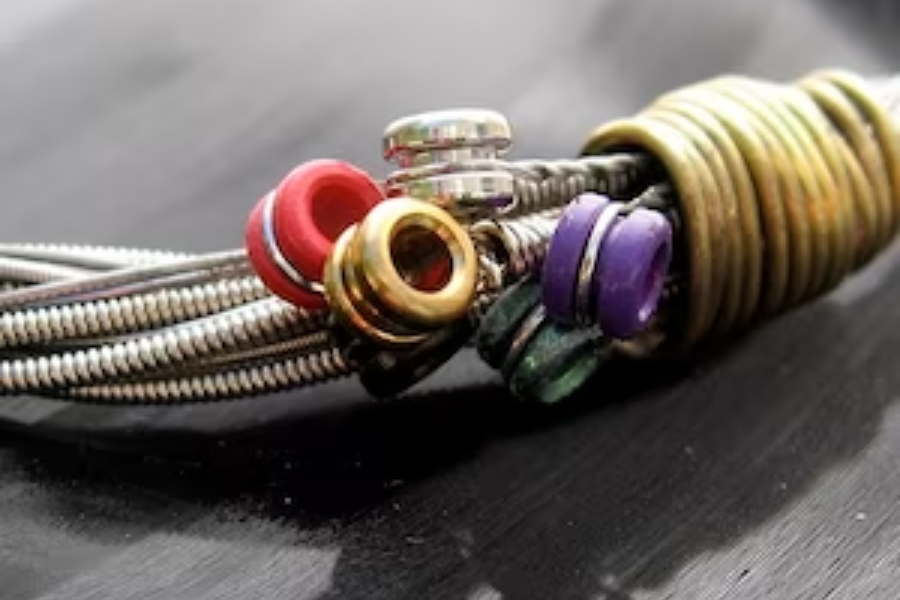When to change electric guitar strings? This question, which seems easy, is actually very complicated and depends on how you play, the tone you like, and even where your guitar is kept. It would be nice if it were as easy as changing the oil in a car every 3,000 miles, but musical instruments are, well, less reliable than cars.
In this guide, Eguitarmania will explain in detail the crucial indicators and timely advice for string replacement. We’ll show you how to tell when it’s time for new strings and why changing them can make your guitar sound amazing again. We’ll also share some tips and tricks that are easy to follow. Get ready to make your electric guitar always sound its best.
When To Change Electric Guitar Strings
For some artists, changing a string before it breaks is the best way to improve their playing. To keep an electric guitar sounding good, playing well, and lasting a long time, it’s important to change the strings every so often. When a musician knows they need to change their electric guitar strings, these are some classic signs:

Difficulty in Tuning
When strings become old and worn out, you might find it increasingly difficult to tune your guitar. There’s a likelihood that an older string may have tuning issues on the fretted notes because wear and tear has caused it to lose the uniform properties along its length that it had when you first fitted it.
Strings that have lost their elasticity and strength tend to detune more quickly, making it hard to keep your guitar in tune. If you’re spending more time tuning your guitar than actually playing it, consider this a sign for a string replacement.
Loss of Tone and Brightness
The most apparent sign that it’s time to change your strings is when your electric guitar loses its tone and brightness.
Fresh strings have a vibrant, bright sound that gradually dulls down due to dirt, oil, and oxidation. If your guitar starts sounding flat or lacks its usual punch, it’s a clear indicator that a string change is due.
Playing Frequency
Strings last longer or shorter, depending on how often you play. Strings may need to be changed every month for artists or players who practice every day, but every three to four months for leisure players. For best results, keep an eye on how you play and change your string changing plan as needed.
Anytime you want to record music or have a show coming up, changing your guitar’s strings can make it sound its best. Fresh strings give music a better, more lively sound that can be heard in both live and taped performances.
Changes in Playing Feel
Over time, strings can become rough and lose their smoothness, affecting your playing comfort. If playing feels more challenging or you notice increased finger fatigue, it might be time for fresh strings. Comfort is crucial for effective practice and performance, making this a vital consideration.
Those who know how brand-new strings feel will know that they have a lovely slinkiness and flexibility right out of the package. After a few weeks or gigs, though, they may start to feel very different and get stiff.
How to Change Electric Guitar Strings
It’s easy to change the strings on an electric guitar, and it gets even easier with practice. You can keep your guitar sounding great by following the steps above and using the right tools.

What Are Some Tools We Need to Change Electric Guitar Strings?
Before diving into the string-changing process, it’s essential to gather the right tools. Having the proper equipment can make the procedure smoother and prevent damage to your guitar. Here are some must-have tools:
- String Winder: This tool speeds up the winding and unwinding of strings on the tuning pegs. Our suggestion : handy tool that costs around $10 – D’Addario 3-in-1 String Winder and Cutter
- Wire Cutter: To trim the excess string from the tuning pegs.
- Guitar Tuner: Essential for tuning your new strings to the correct pitch.
- Cleaning Supplies: Such as a cloth and guitar polish, useful for cleaning the guitar once the strings are off. A good guitar polish will help to clean and protect the finish of your guitar : Guitar Polish by Gibson
- Neck Support: While not essential, a neck support can stabilize the guitar and make string changing easier.
Step by Step Guide : Change Electric Guitar Strings
Here’s a step-by-step guide drawn from personal experience and expert insights:
1. Remove Old Strings
First, loosen the tension on the strings using the tuning pegs. Once loose, you can cut the strings with your wire cutter to remove them more easily. It’s recommended to cover the strings with your hand while cutting to prevent them from snapping back. With the strings off, it’s an excellent opportunity to clean your guitar.
2. Install New Strings
Put each new string through the right hole or slot in the bridge and pull it toward the headstock. Leave enough extra string to wind after threading it through the tuning peg hole that goes with it. As a general rule, you should leave about 1.5 times the length of the string between the bridge and the tuning peg.
3. Wind the Strings
Begin winding the strings using the string winder for efficiency. A common mistake beginners make is over or under-winding the strings on the tuning pegs. Ensure the strings are wound neatly around the peg, with each new coil below the last. This helps lock the string in place and maintain tuning stability. Use your string winder to tighten while ensuring the string wraps neatly below the initial knot.
4. Stretch and Tune
Once all strings are in place and somewhat in tune, gently stretch each string by pulling it away from the fretboard and retune, leaving about 1/4 inch. When you’re pulling up on the strings for stretching, do it carefully around the 12th and then the 5th frets. This precaution ensures even tension distribution and minimizes the risk of snapping a string.
How Often to Change Guitar Strings
Guitar manufacturers and professional musicians offer varied guidance, but a common recommendation is to change strings every 100 hours of play or every 3 to 6 months. However, this is a flexible guideline that should be adjusted based on personal experience and the factors mentioned above.
If you find that sweat or oil from your hands makes your strings rust very quickly, you might want to switch to coated strings. They can make your strings last a lot longer, which makes them a great choice for people whose hand sweat is very acidic.

Moreover, different brands and types of strings have varying lifespans. For example, standard Ernie Ball and D’Addario strings might last around 20–30 hours of playing time, while coated Elixir strings could push this up to 40 hours.
While enjoying the task of changing strings, it might not always be economically justifiable. Besides, string can be a huge waste to the environment.
Should We Recycle Electric Guitar Strings?
Recycling electric guitar strings is something that isn’t always talked about when people talk about being environmentally friendly and being a good performer.
Nickel, steel, and other metals are used to make electric guitar strings. Because these things don’t break down, they can stay in dumps for hundreds of years and pollute the soil and water. In addition, digging for metal to make new strings is an environmentally harmful process.

A lot of groups and businesses have realized that string recycling is important. D’Addario, a well-known string maker, for example, started the Playback String Recycling Program so that players can get free recycling for their old strings. TerraCycle, a unique recycling business, works with the program to make sure the strings are recovered correctly.
By reusing guitar strings and other environmentally friendly habits, the music industry can help protect the planet and show other businesses how to do the same.
Final Thoughts
Knowing when to change electric guitar strings isn’t a one-size-fits-all answer, changing your strings is also a chance to give your guitar some love. Remember to clean it and check for any issues. After a while, strings lose their shine and sound dull. It will tell you when it’s time to change if you listen to it.









